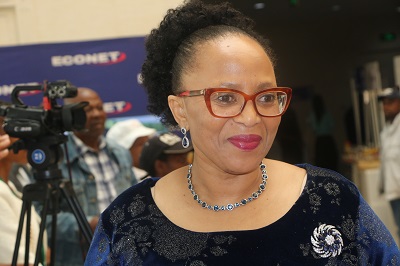By Thoboloko Nts’onyane
MASERU – The Ministers of Finance in Africa had last week committed to invest in nutrition, a move that will expedite the African economic transformation and the attainment of the Agenda 2063 objectives.
These developments unfolded last week in Maseru.
The Head of State who is also African Union (AU) Champion on Nutrition King Letsie III in concert with the African Union Commission convened a two-day ‘High-level dialogue on nutrition financing’ in Maseru. The colloquium on nutrition financing had brought under one roof Ministers of State and Government of African countries, Members of Parliaments, Heads of International Organisations, Members of Diplomatic Corps, and the representatives from the Private Sector and civil society organisations (CSOs).
“We, the Ministers of State and Government of African countries…. [Acknowledge] that investing in nutrition is one of the most cost-effective means to accelerate and sustain socio-economic development and prosperity. Evidence shows that every 1 USD [M18.17] invested in high impact nutrition interventions can generate 16 USD [M290.72] in returns, while child undernutrition in Africa for example, is causing countries in the continent an economic loss estimated between 1.9% to 16.5% of Gross Development Product (GDP).
“Concerned that malnutrition remains one of the major obstacles to human well-being and economic prosperity in Africa. [The] African continent is still battling high levels of hunger and malnutrition. Also concerned that the current investments in nutrition in Africa are not comparable to the scale of the nutrition problem.
“Recognizing the urgency of adequate financing to [end] hunger and malnutrition in all its forms as a prerequisite for achieving African Union Agenda 2063 objectives and sustainable Development Goals.
“Resolve and commit to prioritize investment in nutrition to accelerate Africa economic transformation and attainment of Agenda 2063 objectives,” reads their pledge.
The Ministers had also vowed to among others build capacity of the AU Member States to fill the investment gap with their domestic resources, adopt and advocate for innovative financing strategies for nutrition such as sugar and fat taxation.
They also will strengthen their parliament’s engagement for healthy diets and support with tools of trade to enact model laws that will enable them to be “better gatekeepers” of nutrition and healthy diets at a country level.
As a means to run with the nutrition agenda, the AU had declared 2022 as “the year of Nutrition and Food Security”. Also, the Abidjan Declaration made the same year is to “Accelerate investment, implementation and coordination to improve nutrition and food security in Africa”.
Meanwhile the Malabo Declaration upholds that AU Member States apportion 10 percent of public spending towards financing agriculture and commit to ending hunger and all its forms by 2025.
Dr Rets’elisitsoe Matlanyane, the Minister of Finance and Development Planning said amongst many requirements for the country to develop, one of the most important is human capital development.
“For us to develop human capital and this economy, it starts with nutrition. Good nutrition for us is investment in human capital,” she said, adding that they regard this as the country’s priority.
The Minister said nutrition and agriculture are priorities in her budget and also promised to direct resources accordingly.
She however conceded that the country still lags in implementing the 2014 Malabo Protocol that calls on AU governments to allocate 10 percent of the government’s budget towards agriculture with a view to arrest food insecurity challenge in the long run. For the 2023/24 national budget, the government has allocated about 5 percent to agriculture.
Dr Matlanyane said the African governments ought to look into production of food in various ways in order to be able to better engage the development partners. She said donors need to buy food in Lesotho and not source from outside the borders.
“It is important to create a sufficient fiscal space for us to be able to achieve myriad priorities, we have infrastructure deficit,” she said giving overview of Lesotho’s status quo.
Botswana’s Minister of Health and Wellness Dr Edwin Dikoloti called on the African continent to be involved in farming. He said Africa has big arable land yet they import from the 26 countries that are said to be feeding the world.
“We Africans must know that food is the next oil,” he said.
Dr Edwin showed that it is “the desire and commitment” of the Botswana government to combat malnutrition and hunger.
An MP (member of parliament) Hon Mokhothu Makhalanyane underscored that food insecurity is rife in the rural areas and said it needs to be addressed accordingly.
“We agreed on the commitment as members of parliament who are dealing with legislation, oversight and accountability, that some of the things we believe are still within reach and are achievable, [we are] to make sure that all the laws that are pertaining to the issues of food security and nutrition that in this year are passed by our parliaments,” he stressed.
For her part, the African Union Commission for Health, Humanitarian Affairs, and Social Development, Ambassador Minata Samaté Cessouma said nutrition is critical and therefore the implementation of the road map for nutrition should see the light of the day.
She commended His Majesty King Letsie in his capacity as the AU Champion for Nutrition as doing a good job in sensitizing member states to prioritize nutrition. The Ambassador said agriculture is of utmost importance in Africa boasting about 60 percent of land which investment can be made on.
Cessouma noted that the joint efforts in Africa are undermined by climate change as well as the ongoing war between Russia-Ukraine.
King Letsie III had on February 11, 2019 launched the Nutrition Accountability Scorecard (NAS), an advocacy tool that highlights individual country progress and a snapshot of continental progress on global nutrition targets.


